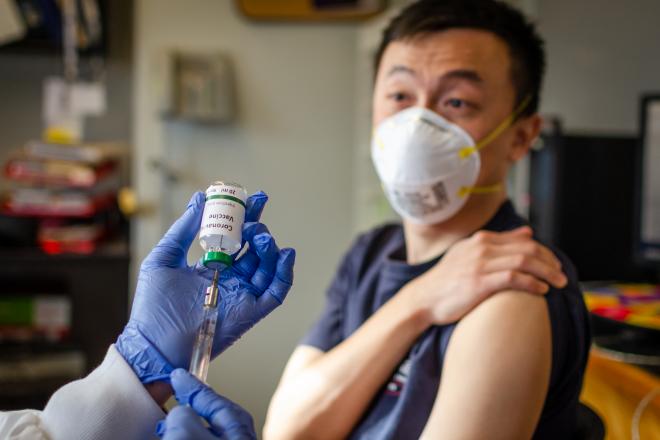
Cooperation and collaboration among countries are vital to ensuring everyone will have access to the future coronavirus disease (COVID-19) vaccine. This is the only way to end the pandemic.
World Health Organization (WHO) Director-General Tedros Adhanom Ghebreyesus recently said a vaccine may be available by the end of the year. The WHO-supported COVAX global vaccine facility is currently testing nine candidates. However, the target is only 2 billion doses by end-2021.
Since there will be limited supply initially, countries need to work together so that there will be fair distribution of vaccines. Experts from PATH, a global nonprofit organization dedicated to health for all, noted several factors that put some countries at an advantage and leave others at a disadvantage in a policy brief published by the Asian Development Bank. Foremost is income level. High-income countries have the resources and often the capacity to develop or secure a vaccine and the facilities and logistics to produce, administer, and store it efficiently and effectively. Low-income countries are likely to be deficient in some or many of these areas.
Global and regional initiatives
To level the playing field, several international initiatives were launched. COVAX, which stands for COVID-19 Vaccine Global Access, includes a risk-sharing mechanism for pooled procurement coordinated by the Global Alliance for Vaccines and Immunizations (Gavi). This involves negotiating advance purchase agreements to ensure the highest volumes for vaccines that meet the WHO criteria at a reasonable price. The COVAX Advance Market Commitment provides financial support for the participation of low-income and lower-middle-income countries in COVAX.
Months before a pandemic was declared, leaders of the Association of Southeast Asian Nations (ASEAN) agreed in November 2019 to work toward achieving vaccine security and self-reliance to prevent illness, disability, and death from such diseases as diphtheria, tetanus, whooping cough, measles, rubella, and hepatitis B. They noted with concern that there have been shortages in essential vaccines in ASEAN member countries in the past, which have led to public health emergencies. These sporadic shortages were because of “manufacturing complexities, supply chain constraints and limited long-term forecasting that would require collective determination to address them.”
Development partners of ASEAN, such as ADB and the European Union, have expressed support for greater cooperation on vaccine security especially during the pandemic.
Aside from multi-country coalitions, there are also bilateral deals in the making.
A paper recently published by the Center for Global Development offers estimates on when a safe and effective vaccine will be available and how long before enough doses will be produced. It noted that country alliances will affect the timelines for achieving national and global herd immunity. “Making agreements now, to share vaccines with other countries if domestic candidates are successful, in return for receiving vaccines from foreign countries if they are not, is a win-win deal,” it said.
Partnerships for the common good
International cooperation is among the policies recommended by PATH experts.
“Partnerships can offer a means for countries to catalyze innovation, coordinate approaches, and foster global solidarity. A framework should be put in place to ensure equity in access because monopolizing supply would run counter to the collective efforts of limiting transmission,” they said. “Countries also need to agree on regulatory policies for vaccine approval to reduce time lags.”
Another important area of cooperation is information sharing on vaccine research and development and on vaccination outcomes to monitor a vaccine’s long-term safety and efficacy. ADB is creating a vaccine knowledge-sharing portal to inform member countries of the latest developments and strengthen their decision-making on future vaccines.
This article was first published by BIMP-EAGA (bimp-eaga.asia) on 13 October 2020.

